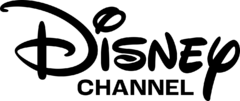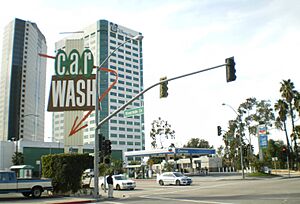Disney Channel facts for kids

Logo used since February 1, 2025
|
|

Headquarters located at 500 S. Buena Vista St, Burbank, California. Pictured on March 3, 2008.
|
|
| Country | United States |
|---|---|
| Broadcast area | Nationwide |
| Headquarters | Burbank, California, U.S. |
| Programming | |
| Language(s) |
|
| Picture format | |
| Ownership | |
| Owner | Disney Entertainment |
| Parent | Disney Branded Television |
| Sister channels |
List
|
| History | |
| Launched | April 18, 1983 |
| Former names | The Disney Channel (1983–1997) |
| Links | |
| Webcast | Watch live |
| Availability | |
| Streaming media | |
| Affiliated streaming service | Disney+ |
| Service(s) | Fubo TV, Hulu + Live TV, Sling TV, YouTube TV, DirecTV Stream |
Disney Channel is a popular TV channel in the United States. It's a main part of Disney Branded Television, which is owned by the Walt Disney Company.
The channel first started on April 18, 1983. Back then, it was called The Disney Channel and was a special "premium" channel. It showed programs for the whole family. In 1997, it changed its name to Disney Channel. It also started focusing more on shows for kids and teenagers aged 6–14.
Today, Disney Channel shows many original TV shows and movies. It also airs movies that were first shown in theaters. As of November 2023, about 70 million homes in the U.S. can watch Disney Channel. This number has changed over time, as more people now watch shows on streaming services like Disney+.
Contents
The History of Disney Channel
Disney Channel began broadcasting across the country on April 18, 1983. It was called The Disney Channel at the time. The channel started with a 16-hour daily schedule. By September 1983, it was available in all 50 U.S. states. By December of that year, it had over 611,000 subscribers.
In October 1983, the channel aired its first movie made just for cable TV, called Tiger Town. This movie even won an award! By January 1985, the channel was making a profit and had 1.75 million subscribers.
In the early 1990s, some cable companies started offering The Disney Channel as a regular basic cable service. This meant more people could watch it without paying extra. On April 6, 1997, the channel officially changed its name to Disney Channel.
Awesome Shows and Movies
Original Movies
Disney Channel has been making its own movies since it started. These movies were first called Disney Channel Premiere Films. In October 1997, they changed the name to "Disney Channel Original Movies" (DCOMs). The first DCOM was Under Wraps, a Halloween movie that aired on October 25, 1997.
One of the most popular DCOMs ever is High School Musical 2. When it first aired on August 17, 2007, 17.2 million people watched it! This set a record for the most-watched TV movie premiere on the channel. Other popular DCOMs include Wizards of Waverly Place: The Movie, Camp Rock, and The Cheetah Girls movies.
The Cheetah Girls movies were also very successful. The first movie in 2003 was watched by over 84 million people worldwide. Its sequel was watched by 8.1 million people in the U.S. The group even went on a concert tour that was one of the top 10 tours of 2006!
Besides its own movies, Disney Channel also shows movies that were released in theaters. These often include films from Walt Disney Pictures, Walt Disney Animation Studios, and Pixar.
Special Programming Blocks
Current Blocks
- Disney Jr./Mickey Mornings – This block airs on weekday mornings. It shows programs for younger kids, like preschoolers, from Disney Jr.. It started on February 14, 2011.
Past Blocks
- Disney Night Time – When Disney Channel was a premium channel, this block showed programs for older audiences in the evenings. It included older movies and special concerts.
- The Magical World of Disney – This was a Sunday night block for movies and specials. It ran from 1990 to 2001.
- Toonin' Tuesday – From 1993 to 1996, Tuesdays were all about cartoons! This block showed animated movies and shows.
- Bonus! Thursday – This block, from 1993 to 1996, featured shows for teenagers. It included series like Kids Incorporated and The All-New Mickey Mouse Club.
- Totally Kids Only ("TKO") – This was an afternoon block of live-action and animated shows for kids in the mid-1990s.
- Block Party – From 1995 to 1996, this block showed popular animated series like Darkwing Duck and DuckTales.
- Vault Disney – This block started in 1997 and showed classic Disney TV shows and specials late at night. It was discontinued in 2002.
- Zoog Disney – Launched in 1998, this block was hosted by animated characters called "Zoogs." It combined TV shows with online games and viewer comments. It ended in 2002.
- Disney Replay – This block, which started in 2013, showed reruns of popular Disney Channel shows from the 2000s. These included Lizzie McGuire and That's So Raven. It ended in 2016.
- Disney XD on Disney Channel – This block showed popular shows from Disney XD, like Phineas and Ferb and Star vs. the Forces of Evil.
Channel Bumpers
Between shows and commercials, Disney Channel uses short video clips called "bumpers." These bumpers have changed a lot over the years. They use different styles like animation, claymation, and live action.
In September 2002, Disney Channel changed its look, including its bumpers and logo. These new bumpers often showed the famous 'mouse ears' logo. They also featured a catchy four-note jingle that is still used today.
One of the most famous bumper styles shows a celebrity from a Disney Channel show holding a wand. They draw the Disney Channel logo on the screen and say, "And you're watching Disney Channel." Fans call these "Wand IDs."
Sports on Disney Channel
Disney Channel has sometimes shown sports-related content. For example, ESPN's broadcasts of the Little League World Series baseball tournament often featured cross-promotions with Disney Channel music properties.
In March 2023, Disney Channel aired a live professional sports event for the first time. It was a special kid-friendly broadcast of a National Hockey League (NHL) game. This broadcast was themed around the Disney Channel animated series Big City Greens. It used 3D animated players to show data from the game.
Other Disney Channels and Services
Current Sister Channels
Disney Jr.
Disney Jr. is a channel for preschoolers. It started as a morning block on Disney Channel in 1997, called Playhouse Disney. In 2012, it became its own 24/7 channel. Disney Jr. shows programs from Disney Channel's preschool library and movies from Walt Disney Pictures. The channel is commercial-free.
Disney XD
Disney XD launched on February 13, 2009. It replaced a channel called Toon Disney. Disney XD shows action and comedy programs. It airs shows from Disney Channel and some new original series. Unlike Disney Channel and Disney Jr., Disney XD does have commercials. The "XD" in its name doesn't have a specific meaning.
Past Sister Channels
- Toon Disney – This channel launched on April 18, 1998. It showed animated shows from Disney and other companies. It also had a block called Jetix for action-oriented shows. Toon Disney became an ad-supported channel in 1999. It was replaced by Disney XD in 2009.
- Jetix – Jetix started as a programming block on Toon Disney in 2004. It showed action-packed animated and live-action series. Jetix channels also replaced Fox Kids channels in other parts of the world.
- Radio Disney – This was a radio network that played music for kids, pre-teens, and teenagers. It started on November 18, 1996. It mostly played current hit music, especially from artists on Disney's own music labels. The Walt Disney Company closed Radio Disney in early 2021.
Other Services
| Service | What it is |
|---|---|
| Disney Channel HD | This is the high-definition version of Disney Channel. It started broadcasting on April 2, 2008. Most new shows and movies are made and shown in HD. |
| Disney Channel On Demand | This service lets you watch select episodes of Disney Channel shows and movies whenever you want. You can find it through your cable or internet TV provider. |
| DisneyNow | DisneyNow is an app and website where you can stream Disney Channel shows live or on demand. You need to have Disney Channel through a TV provider to use it. It replaced an older service called "Watch Disney Channel" in 2017. |
| Disney+ | Launched in November 2019, Disney+ is a streaming service. It has a huge library of movies and TV shows from Disney, Marvel, National Geographic, Pixar, and Star Wars. |
Production Studios
Disney Television Animation
This studio, also known as "Disney Channel Animation," creates original animated shows. These shows are made for Disney Channel, Disney XD, and Disney Jr.
It's a Laugh Productions
This studio makes live-action sitcoms and comedy shows. Many popular Disney Channel shows come from It's a Laugh Productions.
Walt Disney EMEA Productions
This is Disney's production studio in London, England. It helps create original programs in Europe with other companies.
Disney Original Documentary
This is a special group that creates documentary films. These documentaries are shown on Disney Channel and released on Disney+. It started on December 9, 2021.
Video Games
In 2010, Disney Channel All Star Party was released for the Nintendo Wii. This game featured characters from Disney Channel shows like Sonny with a Chance and Wizards of Waverly Place. Many video games based on Phineas and Ferb were also released. The Disney Channel website used to have many online games with characters from shows like Kim Possible and Hannah Montana.
Marketing and Accessibility
In June 2012, The Walt Disney Company announced that it would stop advertising food or drink products that are not healthy. Disney Channel was one of the first media companies to do this.
On July 1, 2012, Disney Channel started offering Descriptive Video Service audio. This service helps people who are blind by describing what is happening on screen. You might see an "AD)))" mark at the start of some shows, like Gravity Falls or Good Luck Charlie, to let you know this service is available.
Disney Channel Around the World
Disney Channel has been available in many parts of the world. This includes North and South America, Europe, the Middle East, Africa, India, and Japan. However, some versions of the channel in places like Australia, the UK, and Southeast Asia have stopped broadcasting. This is because much of their content has moved to Disney+.
On December 14, 2022, Disney stopped showing its programs in Russia. This was in response to the ongoing conflict in Ukraine.
Disney Channel also lets its shows air on other TV channels outside the United States. This happens even if there is already a Disney Channel in that country.
See also
 In Spanish: Disney Channel para niños
In Spanish: Disney Channel para niños
 | Janet Taylor Pickett |
 | Synthia Saint James |
 | Howardena Pindell |
 | Faith Ringgold |

